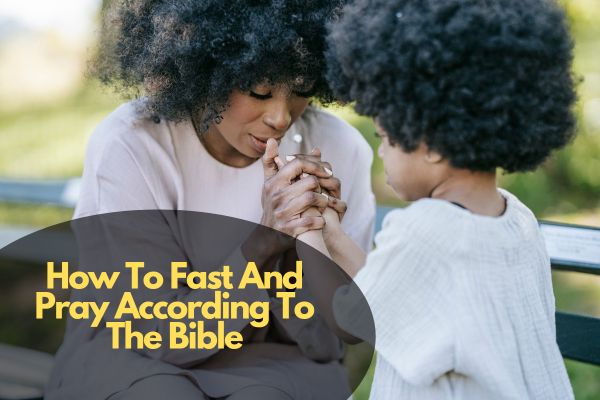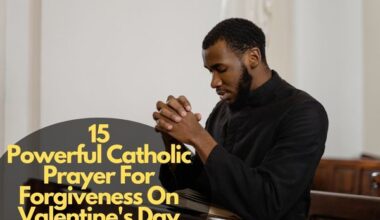Table of Contents Show
Fasting and prayer are two of the most important spiritual disciplines in the Christian faith. Fasting is the act of abstaining from food or drink for some time to focus on prayer and seeking God’s will. Prayer, on the other hand, is the act of communicating with God, either through words, thoughts, or actions.
In this article, we will explore the biblical principles of fasting and prayer and provide practical tips for incorporating these disciplines into your daily life. Whether you are a seasoned Christian or a new believer, this guide will help you deepen your relationship with God and grow in your faith.
How To Fast And Pray According To The Bible
Fasting and prayer are mentioned throughout the Bible as important spiritual disciplines. In the Old Testament, we see examples of fasting and prayer during times of mourning, repentance, and seeking God’s guidance. For example, when King Jehoshaphat was faced with a great army, he called for a fast throughout Judah and sought God’s help in prayer. God answered his prayer and gave him victory over his enemies (2 Chronicles 20:1–30).
In the New Testament, Jesus Himself fasted and prayed for 40 days before beginning His public ministry (Matthew 4:1–11). He also taught His disciples about fasting and prayer, saying that when they fast, they should not do it for show but rather in secret, so that only God would know (Matthew 6:16–18).
Fasting and prayer are often linked together in the Bible, as they both involve a focus on seeking God’s will and direction. Some passages suggest that fasting can enhance the power of prayer. For example, in the book of Ezra, the people of Israel fasted and prayed for God’s protection as they traveled to Jerusalem. God answered their prayer and protected them from their enemies (Ezra 8:21–23).
Biblical Foundations of Fasting and Prayer
Fasting and prayer have been integral practices in the Christian faith for centuries. The Bible provides numerous examples of fasting and prayer, both in the Old and New Testaments. Understanding the biblical foundations of fasting and prayer can help Christians better understand the purpose and benefits of these spiritual disciplines.
Old Testament Examples
In the Old Testament, fasting and prayer were often associated with repentance and seeking God’s guidance. For example, in the book of Jonah, the people of Nineveh fasted and prayed in response to Jonah’s warning of impending judgment. Similarly, in the book of Esther, Queen Esther called for a fast among the Jews in response to Haman’s plot to destroy them.
The prophet Isaiah also spoke about the importance of fasting and prayer, saying, “Is not this the kind of fasting I have chosen: to loose the chains of injustice and untie the cords of the yoke, to set the oppressed free and break every yoke?” (Isaiah 58:6, NIV). This passage highlights the idea that fasting and prayer should not be done for show or as a mere ritual but as a means of seeking justice and freedom for the oppressed.
New Testament Teachings
In the New Testament, Jesus himself fasted and prayed for forty days in the wilderness before beginning his ministry (Matthew 4:2). He also taught his disciples about the importance of fasting and prayer, saying, “When you fast, do not look somber as the hypocrites do, for they disfigure their faces to show others they are fasting. Truly, I tell you, they have received their reward in full. But when you fast, put oil on your head and wash your face, so that it will not be obvious to others that you are fasting, but only to your unseen Father; and your Father, who sees what is done in secret, will reward you” (Matthew 6:16–18, NIV).
The apostle Paul also wrote about fasting and prayer, encouraging Christians to “devote [themselves] to prayer, being watchful and thankful” (Colossians 4:2, NIV) and to “fast and pray, so that [they] may not fall into temptation” (1 Corinthians 7:5, NIV).
Overall, the Bible teaches that fasting and prayer are important spiritual disciplines that can help Christians draw closer to God, seek his guidance, and grow in their faith. By following the examples and teachings found in the Bible, Christians can deepen their understanding and practice of fasting and prayer.
Preparing to Fast and Pray
Before embarking on a fast and prayer journey, it is important to prepare yourself both physically and mentally. Here are some tips to help you prepare for a successful fast and prayer experience.
Setting Your Intentions
Before starting a fast, it is important to set clear intentions and goals for your fast. Ask yourself why you want to fast and what you hope to achieve through prayer and fasting. Write down your intentions and keep them in a visible place to remind yourself of your goals throughout the fast.
Understanding the Types of Fasts
There are different types of fasts mentioned in the Bible. These include a complete fast, a partial fast, and a Daniel fast. It is important to understand the different types of fasts and choose the one that is most appropriate for you based on your physical health and spiritual goals.
Determining the Duration and Scope
The duration and scope of your fast will depend on your personal goals and physical health. It is important to start with a short sprint and gradually increase the duration as your body adjusts. Also, consider the scope of your fast, whether it is a personal fast or a group fast.
By preparing yourself physically and mentally, setting your intentions, understanding the types of fasts, and determining the duration and scope of your fast, you can embark on a successful fast and prayer journey.
Practical Steps for Fasting
Fasting is a powerful spiritual discipline that can help believers grow closer to God. However, it’s important to approach fasting with the right mindset and practical steps to ensure that it’s done safely and effectively. Here are some practical steps for fasting according to the Bible.
During the Fast
During a fast, it’s important to stay hydrated and nourished. Drinking plenty of water is essential to prevent dehydration, and it’s also important to consume nutrient-rich foods before and after the fast. Here are some practical steps to take during a fast:
- Drink plenty of water throughout the day to stay hydrated
- Avoid sugary or caffeinated drinks, as they can dehydrate the body
- Consume nutrient-rich foods before and after the fast to nourish the body
- Spend extra time in prayer and meditation to draw closer to God
Breaking the Fast
Breaking a fast requires careful attention to avoid overeating or consuming the wrong types of foods. It’s important to ease back into eating gradually and to choose foods that are easy to digest. Here are some practical steps to take when breaking a fast:
- Start with small portions of easily digestible foods, such as soup or fruit
- Avoid heavy, fatty, or spicy foods that can be hard to digest
- Chew food thoroughly and eat slowly to aid digestion
- Spend time in prayer and reflection to give thanks for the fast and seek God’s guidance
By following these practical steps, believers can approach fasting with confidence and knowledge, knowing that they are taking care of their bodies and drawing closer to God.
Conclusion
Fasting and prayer can be challenging, and it is helpful to have a support system in place. This can include a group of fellow believers who are also fasting and praying, or an accountability partner who can provide encouragement and accountability.
It is also important to be honest and transparent about the fast. This means being open about struggles and challenges and seeking help when needed. This can help to build a sense of community and support, and it can also help to prevent feelings of isolation or discouragement.
In summary, during a fast, it is important to commit to daily prayer and Bible reading, stay hydrated, and seek community and accountability. These practices can help to maintain focus and spiritual discipline and can also provide support and encouragement during the fast.
Frequently Asked Questions
Why should I fast and pray, according to the Bible?
Fasting and praying are spiritual disciplines emphasized in the Bible as a means of seeking God’s guidance, repentance, and drawing closer to Him. In Matthew 6:16–18, Jesus teaches about fasting with the right motives, emphasizing a personal and intimate connection with God. Fasting can be a way to humble oneself before God, seeking His will and direction in various aspects of life.
How should I fast and pray according to the Bible?
The Bible guides the principles of fasting and prayer. In Matthew 6:16–18, Jesus advises fasting without drawing attention to oneself, maintaining sincerity and humility. Additionally, passages like Joel 2:12 and 2 Chronicles 7:14 highlight the importance of repentance and seeking God’s face during fasting. The Bible also encourages persistence in prayer (Luke 18:1–8) and emphasizes faith in God’s ability to answer prayers (Matthew 21:22).
Are there specific types of fasts mentioned in the Bible?
Yes, the Bible mentions various types of fasts. The most common is abstaining from food, as seen in Daniel’s partial fast (Daniel 10:3) and the 40-day fast of Jesus (Matthew 4:2). Additionally, there are examples of fasting for specific foods or luxuries. Corporate or community fasting is also highlighted in passages like Joel 2:15–16. The key is the heart’s attitude and sincerity in seeking God. Fasting is not just a ritual but a way to express devotion and dependence on God.








